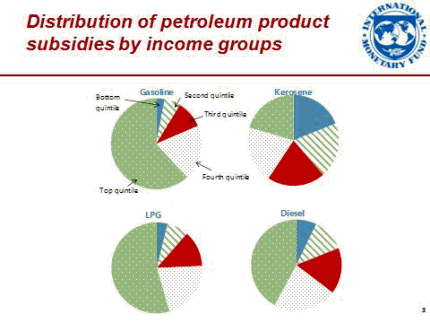Some subsidies are not like other subsidies
Austin Healey is arguing that the solar feed in tariff should stay at some gloriously elevated level because:
Mr Healey visited 10 Downing Street to argue the case for a U-turn of the proposed changes last week. The Government currently spends £26bn a year subsidising the fossil fuel industry and £3.5bn on solar: “We think the drop in the tariff is draconian,” said Mr Healey.
The Telegraph helpfully linking that statement to this excellent piece by our own Sam Bowman.
When you read the report, it becomes clear pretty quickly that the IMF’s definition of a subsidy is a little different from everyone else’s. Usually, subsidies describe the government paying money to a firm or industry to encourage production, ostensibly to reduce prices for consumers. Think of the EU’s Common Agricultural Policy, or the cash given to the British steel industry during the Sixties and Seventies. These are unpopular with economists. Subsidies end up making firms bloated, inefficient, and more interested in satisfying government bureaucrats than their customers. And those customers still end up paying for those subsidies with their taxes. But the IMF’s idea of “subsidies” to fossil fuels refers to something completely different. They have taken the indirect costs to society of using energy – air pollution, traffic congestion, climate change – and, if governments haven’t imposed special taxes on one, called it a “subsidy”.
That is, Healey's statement is not actually true, not within the normally accepted meaning of the word "subsidy".
But there's more to it than that. The government does not in fact spend £3.5 billion a year subsidising solar. Rather, it insists that solar should be able to overcharge us for their production. And what is being decided now is that that insistence on the consumer being gouged is to end, or at least decrease.
Yes, it's very definitely a subsidy, a subsidy arising as a result of government action, but it's not government spending upon such subsidy. It's government market rigging to provide it. And the equivalent sum over on the fossil fuel side is, in the best gloss one can put on it, an absence of government rigging the market to account for externalities.
Not all subsidies are the same.

